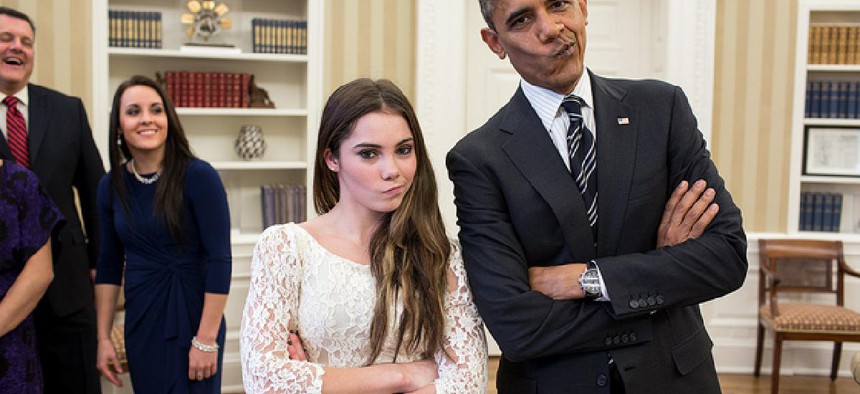
White House Flickr, Pete Souza, via barackobama.tumblr.com
The Meme Election and the Tumblr Campaign
How the Obama camp used images to build a brand.

Subscribe
:
Newsletter
Facebook
LinkedIn
The president was not impressed.
Or, more accurately, the president was Not Impressed. When, earlier this month, the newly re-elected commander-in-chief met the gymnasts of the U.S. Olympic team , he did what any president would do: He took a photo op, posing with the Fierce Five in the Oval Office. But he also did something that not every president would do: He took a meme op. The president stood next to McKayla Maroney, she of #notimpressed fame, and the pair reenacted her signature scowl.
The photo that resulted -- a months-old meme, ossified in Internet time, made fresh by the fact that it was being acted out by a president -- was promptly posted to the Obama campaign's Tumblr, barackobama.tumblr.com , where it joined a series of fellow memes -- and animated GIFs, and videos, and snappy commentary, and earnest commentary, and other such Items of Internet. The image of a meme-faced Commander-in-Chief, cheeky and epic at the same time, was -- or, at least, seemed -- tailor-made for social media. And for, in particular, Tumblr, a medium that manages to mix irony and sincerity in pretty much equal measure.
Campaign 2012 has been dubbed, fairly or not, the "
Meme Election
." And it was, all in all, the most documented, and probably the most participated-in, campaign in living
memery
memory. Much of its pageantry was
live-GIFed
. Obama's victory in it was met, unsurprisingly, by image round-ups with names like "
Yes, We GIFed
." And GIF we did. We also hashtagged and parody-accounted and meme-made and
fixtedthatforyoued
and
bindered
and
Big Birded
and
Eastwooded
our way through many, many months of pervasive politicking -- to the extent that a section of Know Your Meme has been dedicated to covering, simply, the "
2012 United States Presidential Election
." Though it's easy to overattribute the effect that all this Internet-y activity had on the election's outcome itself -- memes are small; the country is large -- it's also pretty obvious that memes and their counterparts, both despite and because of their smallness, represent a significant shift in participatory politics. Which is to say, in politics.
NEXT STORY: Three Ways to Keep Your Meetings From Leaking






